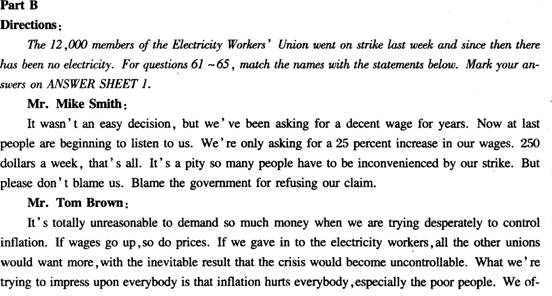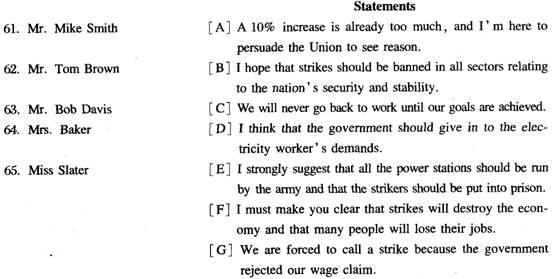
26.[A] turning[B] rolling[C] twisting[D] rotating
27.[A] find[B]feel[C] drop[D] fall
28.[A] relieved[B] renewed[C] refreshed[D] released
29.[A] impossible[B] unable[C] powerless[D] incapable
30.[A] titled[B] iabeled[C] entitled[D] named
31. [A] implies[B] suggests[C] proposes[D] indicates
32.[A] related[B] tied[C] combined[D] put together
33.[A] more[B] less[C] shorter[D]later
34.[A] nervousness[B] anxiety[C] stress[D] tension
35.[A] enhances[B] attaches[C] inserts[D] adds
36.[A] power[B] energy[C] vigor[D]force
37.[A] varies[B] differs[C] alters[D] contrasts
38.[A] nevertheless[B] since[C] though[D] however
39. [A] because[B] spite[C] despite[D] instead
40.[A] pause[B]break[C] vacation[D] interruption
41.[A] earlier[B] early[C] previously[D] sooner
42.[A] spiritually[B] consciously[C mentally[D] emotionally
43.[A] asleep[B] awake[C] alert[D] active
44.[A] out[B] on[C] away[D] off
45.[A] as soon as[B] when[C] before[D] after
SectionIII ReadingComprehension
(40 minutes)


46. When did the writerarrive at Londonairport?
[A] inthe early morning.
[B] Lateat night.
[C] Atnoon.
[D] Latein the morning.
47. What can we conclude fromthe questions asked by the customs officer?
[A] Hewas just doing his duty by asking the passenger some usual questions.
[B] Hemust have noticed the writer' s ugly watch.
[C] Hewanted to embarrass the writer.
[D] Hemust have noticed the writer's tiredness,
48. What did the writer thinkof the watch he bought in the market?
[A] Hewas fond of the watch because it was a Rolex.
[B] Hefound the watch useful though it was very cheap.
[C] Hedidn't like the watch at all.
[D] Hewas indifferent to the watch.
49. What must have happenedto the writer in the end?
[A] Hemust have spent a long time at the customs and must have been let go withoutany punishment.
[B] Hemust have been given a fine as a punishment.
[C] HisRolex must have been confiscated.
[D] Hischeap watch must have been confiscated.
50. What do you think is thetone of the story?
[A]Humorous.
[B]Sarcastic.
[C]Solemn.
[D]Matter-of-fact.

46. When did the writerarrive at Londonairport?
[A] inthe early morning.
[B] Lateat night.
[C] Atnoon.
[D] Latein the morning.
47. What can we conclude fromthe questions asked by the customs officer?
[A] Hewas just doing his duty by asking the passenger some usual questions.
[B] Hemust have noticed the writer' s ugly watch.
[C] Hewanted to embarrass the writer.
[D] Hemust have noticed the writer's tiredness,
48. What did the writer thinkof the watch he bought in the market?
[A] Hewas fond of the watch because it was a Rolex.
[B] Hefound the watch useful though it was very cheap.
[C] Hedidn't like the watch at all.
[D] Hewas indifferent to the watch.
49. What must have happenedto the writer in the end?
[A] Hemust have spent a long time at the customs and must have been let go withoutany punishment.
[B] Hemust have been given a fine as a punishment.
[C] HisRolex must have been confiscated.
[D] Hischeap watch must have been confiscated.
50. What do you think is thetone of the story?
[A]Humorous.
[B]Sarcastic.
[C]Solemn.
[D]Matter-of-fact.

56. According to the passage,what does the underlined phrase "lived a bit "mean?
[A] Tobe older than others.
[B] Totravel to more countries.
[C] Tohave abundant life experience.
[D] Tohave longer training in interpreting.
57. Candidates for thetraining course in London' s University of Westminsterneed the follow-ing qualifications EXCEPT
[A]having wide cultural interests
[B]having a good knowledge of current affairs
[C]being familiar with the languages they translate
[D]being eloquent lecturers
58. The interpreters rely onadrenaline because
[A] itcan help finish their work quickly
[B] itcan make them excited
[C] itcan prevent them from heart disease
[D] itcan make them work harder
59. According to the passage,we can infer that
[A]language has nothing to do with interpreting
[B] onlythose postgraduates from the foreign language universities can work asinterpreters
[C]interpreters must live in the country where the required language is spoken
[D] interpretersbuild the bridge for international communication60. The job as interpreterhas the following characteristics EXCEPT
[A]funny
[B]intrepid
[C]dangerous sometimes
[D]exciting





